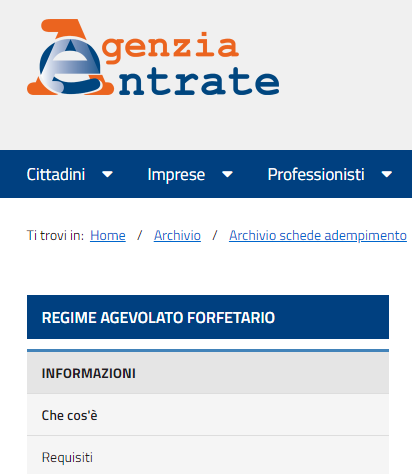Rent to Buy: what it is and how it works

Do you want to buy a house but cannot find a bank to put up the finance you need. Are you concerned about making a commitment to buy but not sure about the timing? Italian law has a solution: the “Rent to Buy” scheme (affitto con riscatto). The scheme allows you to take immediate possession […]
2018 Italian Tax Update

[embeddoc url=”https://taxing.it/wp-content/uploads/2018/09/The-2018-Spring-Italian-Tax-update-2018050-110F_opt.pdf” viewer=”google”]
Tax on Capital Gains for Individuals – Disposals of Shareholdings
Background – Taxation of Gains and Losses The disposal of shareholdings (e.g., shares or equity interests in companies) in Italy may trigger a charge to Italian tax on any capital gain under the Italian Tax Code (DPR 917/1986). The tax treatment differs significantly based on the percentage interest in the company and Italian tax residency […]
The Regime Forfettario – Flat Rate Tax Regime for Freelance Businesses

Introduction A special tax scheme (Regime Forfettario) offers a flat rate of tax on gross income for taxpayers looking to get themselves registered for VAT in Italy and carry on a self-employed business or profession. The various schemes for small taxpayers (the Regime dei Minimi/Regime Forfettario) have seen a number of changes over the years and […]
Italian tax regime to encourage high net worth individuals to move to Italy
Background Italy’s 2017 Finance Law introduced a tax regime designed to compete with other special tax regimes around Europe that provide a special tax regime to attract people to come and live in the country offering the regime. The Italian regime is targeted at attracting high net worth individuals to Italy. It required, a the […]
Foreign Asset Reporting, Section RW, IVIE & IVAFE – Wealth Tax on Foreign Property
Increase in IVIE and IVAFE Starting from FY 2024, the rate of IVIE, the tax on the value of foreign (non Italian) real estate located abroad, will increase from 0.76% to 1.06%. This increase applies generally to all real estate situated outside Italy by a Italian tax resident. IVAFE, the tax on the value […]
What is an apostille?
An “apostille” is a form to be applied to documents for use in countries that are party to the 1961 Hague Convention. The convention is designed to rationalise procedures for the recognition and validation of legal documents executed in one signatory country and to be used in another signatory country. The apostille certifies that the […]
UK Italy Double Tax Treaty – Income Taxes
The UK/Italy Convention for the Avoidance of Double Taxation of Income (or Double Tax Treaty) was signed at Pallanza on 21 October 1988. It entered into force on 31 December 1990. It came into effect in the United Kingdom from 1 January 1991 for petroleum revenue tax, from 1 April 1991 for corporation tax and […]
Second payment on account
By 30 November of each year, Italian taxpayers must make payment of the second payment on account (acconto) of their tax liability for the current year. The first payment is due earlier in the year at the same time as the tax due on income reported in the annual tax return for income received during […]
Historical Rates of Italian Income Tax

These are the personal income tax rates that apply after 1 January 2024. For applicable rates before that date please click ….
